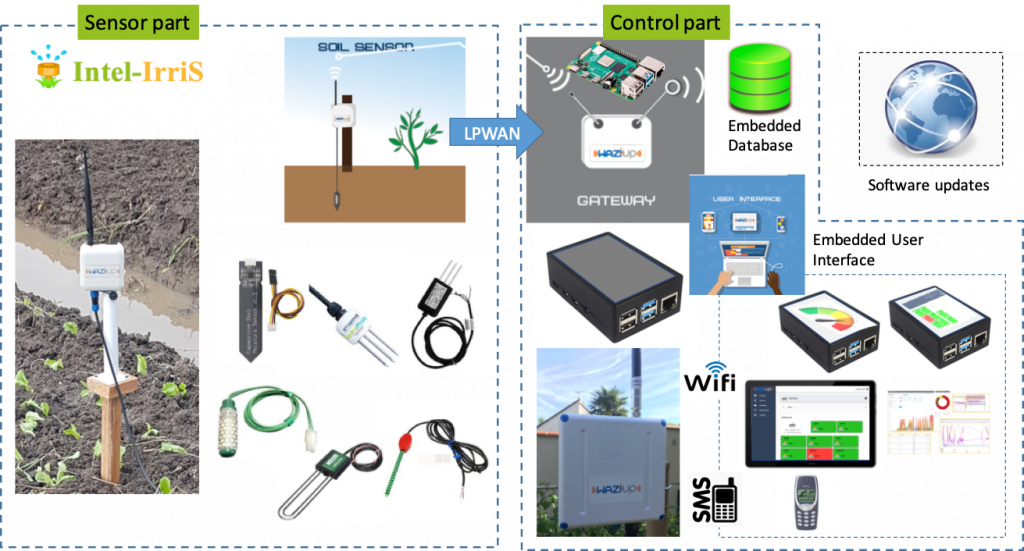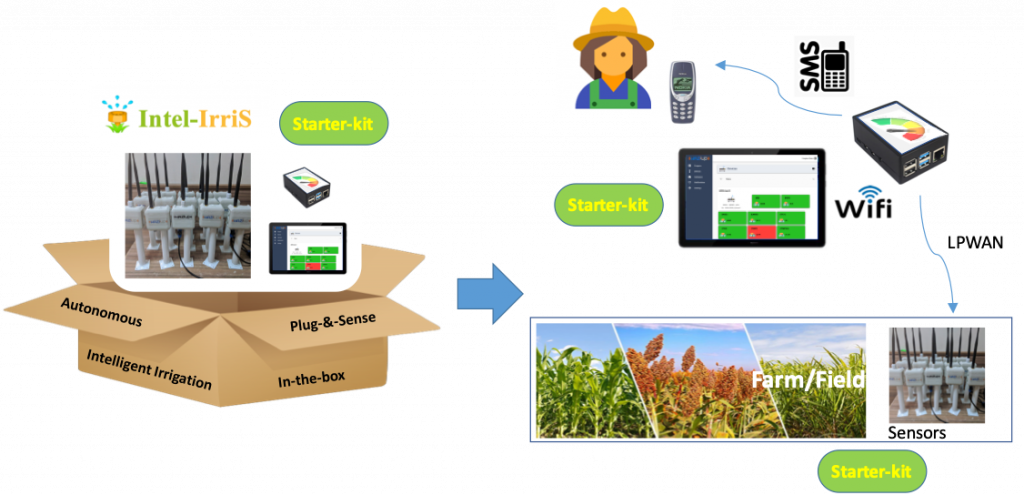Methodology
One of the core concepts behind smart farming is the “cyclic optimization process where data have to be collected from the field, analysed and evaluated and finally used for decision making for site-specific management of the field”.
This core concept can be provided at several levels of cost and complexity that may not be suitable for the needs of smallholders. For instance, commercial soil moisture sensors, capable of sensing water conditions at several depths can cost thousands of euros. The entire hardware and software platform to manage irrigation in a farm represents an investment (both in terms of money and complexity) that may appear profitable for large farms with technical persons in place but that can hardly be cost-effective for smallholders without technology background.
In many “traditional” architecture, the smallholder is bound to the infrastructure provider as the control system is sold as “Software as a Service” (SaaS) on Internet Clouds with substantial annual fees. In addition, in the context of smallholders, even though there are irrigation techniques that are well-known to be more efficient than others, the cost of installing the infrastructure for a new irrigation technique can also be overwhelming.
Intel-IrriS proposes the low-cost sensor design concept where a set of environmental sensors for irrigation control (e.g. soil moisture/ conductivity/ tensiometry, soil & surface temperature, sun exposure, …) will be designed & built from off-the-shelves low-cost physical sensors following an open design approach. The smart control system (i.e. the gateway) will also follow the low-cost approach, taking advantage of powerful embedded computer boards such as the well-known RaspberryPi which costs less than 40€. Such embedded computer boards will be used as a versatile and smart gateway to receive data from low-cost sensor devices – using state-of-the-art long-range LPWAN radio technologies such as LoRa – and to host the control system as well as all the software intelligence that will be developed: Decision Support System (DSS), Artificial Intelligence (AI), user/visual interface, database, … enabling the “in-the-box” concept where all the components to install, set up and start the entire system are already in place, without any mandatory Internet or remote cloud connectivity. Finally, the whole system can be integrated into existing irrigation techniques/infrastructures where available water that can come from several sources (ground water, river, water harvesting, …). This approach along with the “in-a-box” concept will maximize adoption by smallholders.
Intel-IrriS innovates in integrating cutting-edge smart technologies, including AI-enabled technologies, into the autonomous irrigation control system (i.e. the gateway) as they can definitely bring benefits if applied appropriately. Intel-IrriS will realize these benefits as follows. First, already validated Decision Support System with rules-based approach will be implemented as proof-of-concept. Then, advanced AI-based processing for irrigation domain will be investigated and prototyped into the embedded control system using advanced Machine Learning and Deep Learning methods, taking advantage of the increasing availability of AI accelerator modules (Google Coral USB Accelerator, Intel Neural Compute Stick, Rockchip’s Toybrick AI Compute Stick to name a few). Specific training procedures of the AI system will use agricultural knowledge and datasets to provide an efficient decision and recommendation system running locally on the gateway. This very innovative approach will be realized with a research & development cycle tightly involving ICT experts and agriculture experts in order to develop new soil/water/plant-climate models that can consistently take into account several parameters
Intel-IrriS’s components (i.e. low-cost sensors, gateway & smart control system) will be designed following cyclic specification, adaptation, development and piloting phases in a multi-actor approach. For instance, calibration of sensors is usually soil-type-dependent therefore it is critical that the process is realized with a close collaboration between agronomist experts, ICT experts and end-users. This inter-disciplinary approach will enable innovative model propositions and the integration of diverse knowledge streams, therefore maximizing Intel-IrriS’s success in proposing a low-cost and smart irrigation control system that is well tailored for the specificities of the context and adapted to smallholders’ needs as well as to guarantee a long-term viability. The Stakeholders & Experts Advisory Committee (SEAC) that will be formed to drive discussions and create synergies will also play and important role to bring knowledge from various stakeholders and actors. The Smallholders Piloting Program will develop a participatory approach where developed solutions will be iteratively tested in real environment enabling active interactions with farmers. It will run for a duration of 30 months.


